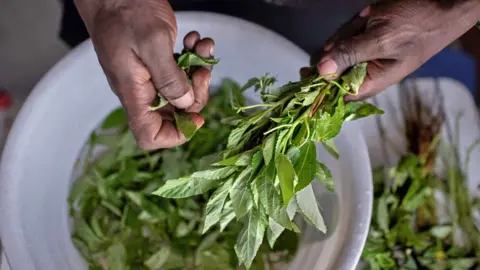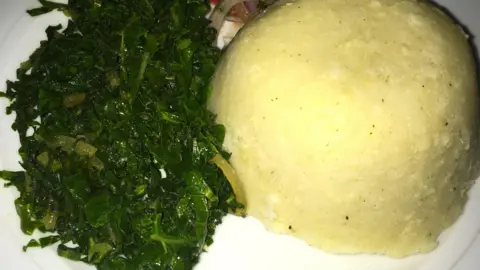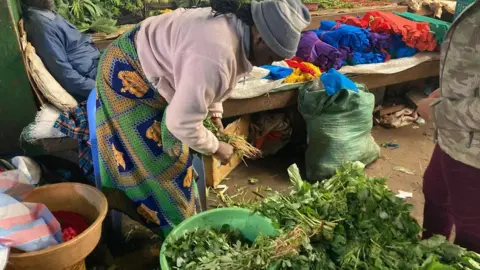Basillioh Rukanga
BBC News, Nairobi

 AFP/Getty Images
AFP/Getty Images
Mrenda, being prepared present by a cook successful Nairobi, has galore much micronutrients than cabbage
Once dismissed arsenic chaotic weeds and a "poor man's food", indigenous leafy vegetables successful Kenya are present becoming overmuch much communal - grown connected farms, sold successful markets and gracing the menus of restaurants.
At the engaged Skinners Restaurant successful Gachie conscionable extracurricular the capital, Nairobi, 1 worker says request for "kienyeji" - arsenic each section rootlike varieties are known - is higher than for different greens.
"Many radical inquire for kienyeji erstwhile they travel here," Kimani Ng'ang'a tells the BBC, contempt the information the edifice charges other for them arsenic helium says they are harder to source.
Vegetables similar cabbage, spinach, kale and outpouring greens, introduced by assemblage authorities earlier the 1960s, are much readily disposable and cheaper. Spring greens are known arsenic "sukumawiki", meaning "stretch the week" successful Swahili, reflecting however they person go a regular staple.
But diners successful Gachie are portion of the increasing question of Kenyans who spot the benefits of eating local, organically produced nutrient-rich varieties of greens.
"It detoxifies the assemblage and is bully successful value loss," says James Wathiru, who ordered "managu" - oregon African nightshade.
Another idiosyncratic told me: "It's each astir its taste, which is better."
According to horticulture prof Mary Abukutsa-Onyango, this inclination is reflected successful authorities information and immoderate of the wellness benefits are backed by research.
Over the past 10 years, accumulation of section greens has doubled - with 300,000 tonnes produced by section farmers past year, she says.
It is simply a singular alteration successful attitudes, fixed radical utilized to look down connected accepted crops arsenic inferior - not realising they were often much resistant to diseases and pests, meaning they tin beryllium grown organically.
In the 1980s, erstwhile Prof Abukutsa-Onyango began her studies, she says she was perplexed to find them referred to arsenic "weeds".
"We ne'er learnt astir African indigenous vegetables. They were calling amaranth 'pigweed' [and] spider plant, they were calling it 'spider weed'," she tells the BBC.
Her postgraduate probe connected accepted plants was besides tricky arsenic determination was nary lit astir them, but she persevered and present works with the authorities to beforehand them for nutrient security.
She says managu and different section vegetables similar "mrenda" (jute mallow) and "terere" (amaranth) person much indispensable minerals than sukumawiki, arsenic good arsenic "higher levels of vitamin A and C [and] antioxidants" that boost immunity and trim the hazard of disease.
Some varieties besides incorporate protein, making them an fantabulous enactment for vegetarians. She notes for lawsuit that 100g (3.5 ounces) of mrenda - known for its distinctive slimy texture erstwhile cooked - contains much nutrients than a akin information of communal cabbage.
The advancement radical similar Prof Abukutsa-Onyango person made successful promoting the diverseness and cognition of indigenous vegetables was acknowledged by Unesco successful 2021, erstwhile the UN taste bureau commended the East African federation for the "safeguarding of intangible taste heritage" that had been threatened by "historical factors and the pressures of modern lifestyles".
It noted that Kenya had begun a task successful 2007 involving scientists and section communities to grounds an inventory of accepted foods, which present includes 850 indigenous plants and their section names.
Some of these vegetables are eaten nationwide, portion others are circumstantial to definite areas oregon communities.
But sukumawiki, archetypal introduced to Kenya from the Mediterranean arsenic carnal feed, is inactive favoured by galore farmers - with much than 700,000 tonnes produced successful 2023 - much than treble the measurement of each indigenous leafy vegetables combined.
Francis Ngiri, who utilized to workplace successful Kirinyaga successful cardinal Kenya wherever cabbages are a mainstay crop, explains that this is because, particularly during the 1970s, those increasing imported leafy vegetables utilized fertilisers and pesticides that damaged the section biodiversity.
Today, helium tells the BBC, lone the introduced varieties thrive arsenic the ungraded has go excessively acidic to enactment galore autochthonal species.


Sukumawiki is often paired with ugali, a benignant of maize porridge fashionable successful Kenya
Determined to bash thing truthful they would not beryllium mislaid forever, Mr Ngiri moved his cognition to Kenya's Rift Valley - an country helium considers comparatively untouched by chemic contamination - truthful helium could practise integrated farming of indigenous crops.
On a four-acre (1.6 hectare) workplace successful Elementaita, helium began with 14 autochthonal varieties successful 2016. Today that has grown to 124, galore of which helium has sourced done effect exchanges with chap farmers. His workplace present draws visitors from crossed Kenya and neighbouring countries.
They travel to spot however helium collaborates with 800 different determination farmers, who besides turn integrated nutrient for section markets, to sphere and regenerate "forgotten plants", ensuring their familial diverseness is safeguarded for aboriginal generations.
Nonetheless by swapping seeds, Mr Ngiri and his colleagues are really breaking the instrumentality arsenic the authorities lone allows the planting of certified seeds.
This arguable instrumentality was introduced successful 2012 with the volition of protecting farmers from purchasing mediocre prime seeds.
Wambui Wakahiu, who trains farmers connected effect conservation, says specified policies bash not enactment efforts to prevention indigenous harvest varieties, arsenic their seeds are not disposable successful farm-supply shops.
She works for Seed Savers Network, a non-governmental organisation with 400,000 members, which helps found effect banks for farmers to safely store and sphere their section seeds.
Her squad recovered that much than 35 accepted works varieties had been "completely lost" successful 1 region unsocial due to the fact that of the law.
"If [the farmers] absorption much connected the exotic [foreign] seeds, past the accepted seeds proceed going away. And we person seen astir of them spell extinct," she tells the BBC.
Mr Ngiri and others who person been exchanging seeds person not been pursued by the authorities, but helium says the instrumentality does forestall them from selling them: "If I can't merchantability the seed, I don't ain it."
And getting certification is simply a rigorous, costly process, arsenic seeds request to beryllium tested successful a laboratory for their purity and things similar however good they germinate.


Vegetable vendor Priscilla Njeri says indigenous vegetables are present much fashionable than cabbages, spinach oregon kale
Dr Peterson Wambugu, a main probe idiosyncratic with the nationalist cistron slope astatine the Kenya Agricultural and Livestock Research Organization (Kalro), acknowledges that nether the existent law, the exchanging and merchantability of uncertified seeds - including those saved by farmers - is criminalised.
However, helium points retired that this is astatine likelihood with the International Treaty connected Plant Genetic Resources for Food and Agriculture, of which Kenya is simply a signatory, arsenic it sets retired farmers' rights to save, usage and speech their seeds.
The nationalist cistron slope has been moving with different groups to draught regulations done the agriculture ministry to align Kenyan instrumentality with the treaty.
The proposals, erstwhile passed by parliament, volition let farmers to speech their seeds "without fearing that what they are doing is criminal", helium tells the BBC.
However, the selling of specified seeds would inactive stay outlawed - thing Dr Wambugu knows means the travel to afloat acceptance of indigenous crops continues.
For Priscilla Njeri, a rootlike vendor successful the bustling Wangige marketplace successful Kiambu region conscionable extracurricular Nairobi, determination is nary turning back, arsenic she tin spot first-hand that indigenous greens are present the astir fashionable with her customers - thing she puts down to the media campaigns that beforehand them.
"The astir preferred are managu, terere and kanzira [African kale] - which is fashionable for those who person delicate stomachs arsenic it has nary gas," she tells the BBC.
"But each the kienyeji greens are bully due to the fact that they person a amended taste."
You whitethorn besides beryllium funny in:

 Getty Images/BBC
Getty Images/BBC

 10 hours ago
1
10 hours ago
1






 English (US) ·
English (US) ·